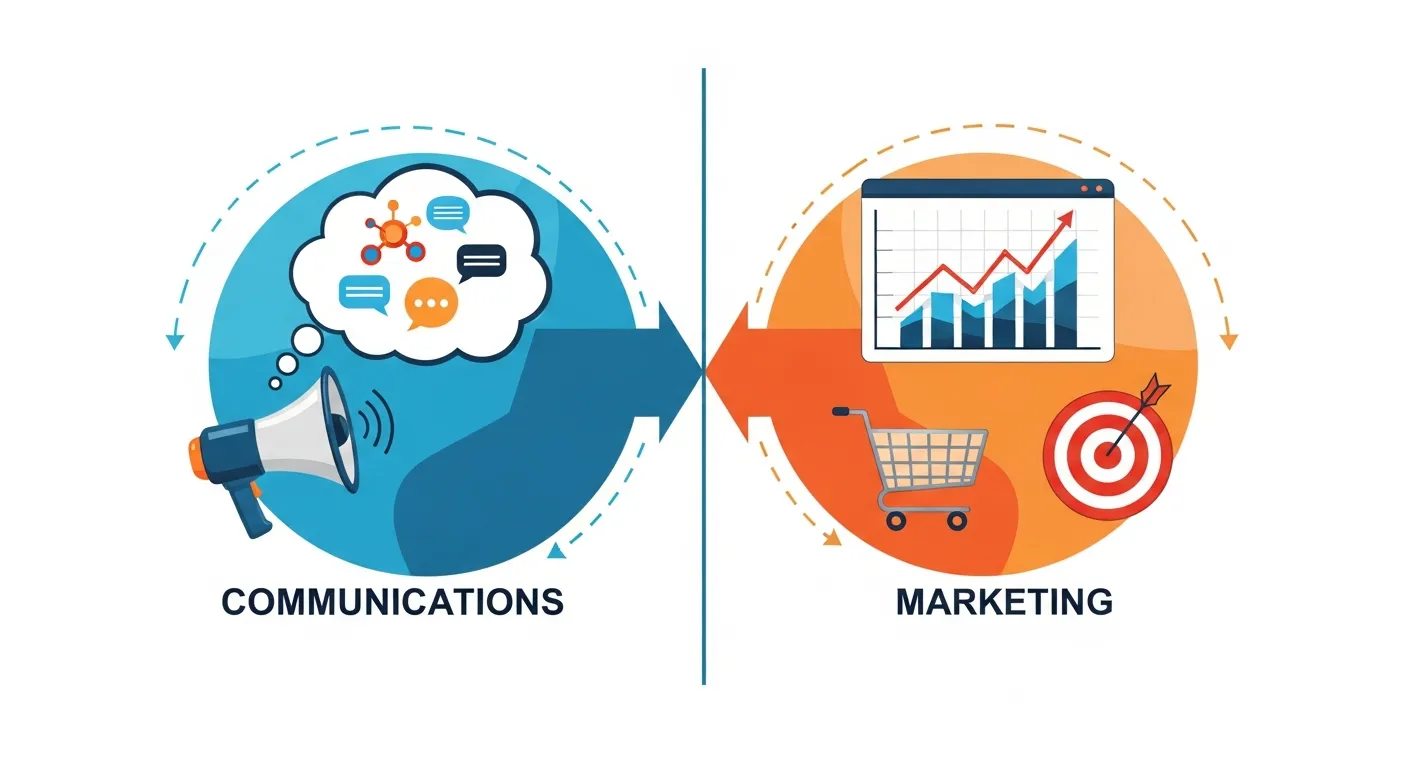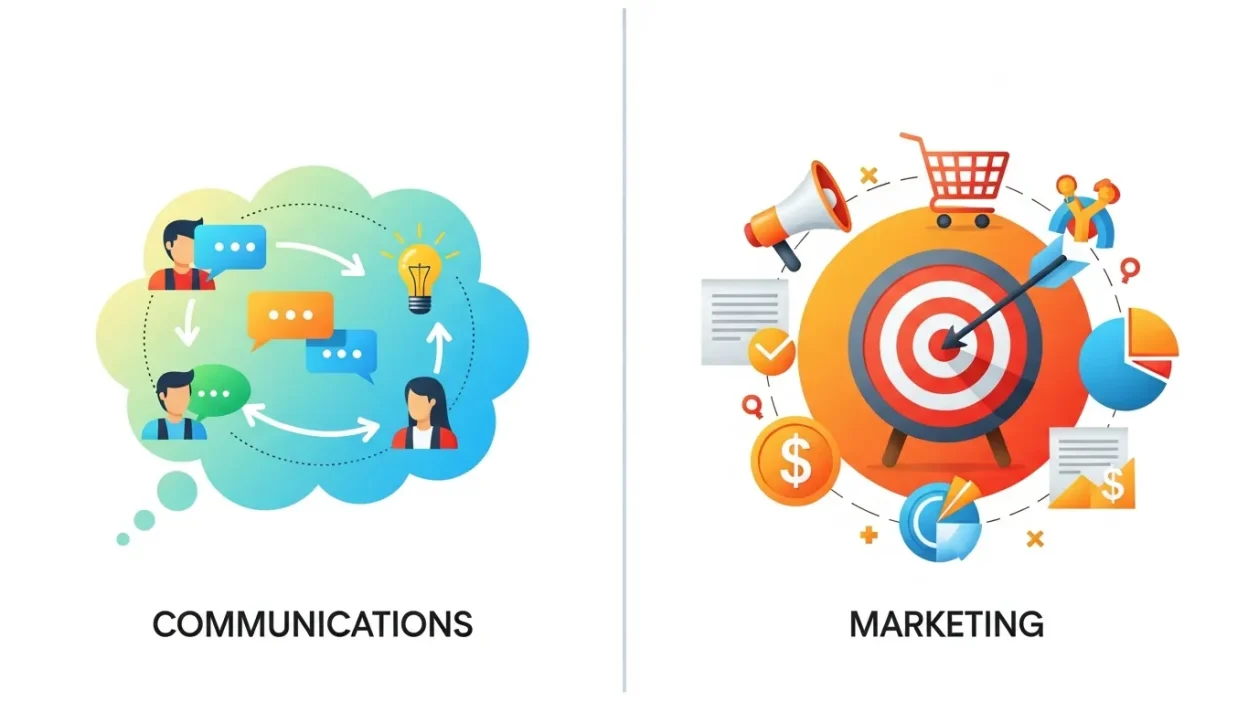Communications vs Marketing are two critical yet distinct functions in any organization. Communications focuses on building trust, credibility, and strong relationships with internal and external stakeholders, while marketing is aimed at promoting products or services, generating leads, and driving revenue. When effectively combined, they create a powerful synergy that ensures consistent messaging, strengthens brand reputation, and achieves both long-term and short-term business goals.
In the world of business strategy, one often runs across terms that sound like they ought to be interchangeable. “Communications” and “marketing” are just two words that frequently get elided. Although both are vital to an organization’s success, each has its own function and methods of accomplishment. Specific results are required. Communicholic Renaissance is your best strategy for getting yourself educated about the differences between communications and-marketing. We will define them and their functions persist in nature, outline key tactics of the two approaches, and show how their combination achieves organizational goals.
What Is Communications?

In essence, communications is the art and science of building and maintaining meaningful relationships with a diverse range of audiences. It goes beyond simply conveying information—it’s about shaping perceptions, sharing the organization’s story, and ensuring that every stakeholder understands its vision, mission, and values.
Effective communications serves both internal and external audiences. Internally, it ensures employees are informed, aligned, and motivated, fostering a cohesive culture and clear understanding of organizational goals. Externally, it helps establish credibility, builds trust with customers, partners, investors, and the media, and reinforces the organization’s reputation in the broader market.
Communications encompasses a variety of methods and channels—from press releases, newsletters, and social media posts to speeches, presentations, and thought leadership content. It also plays a critical role in crisis management, guiding organizations in responding quickly and transparently to challenges while protecting their brand image.
At its core, communications is not just about delivering messages; it’s about creating connections. By understanding the needs, concerns, and expectations of different audiences, communicators craft narratives that resonate, foster loyalty, and ultimately strengthen the organization’s long-term success.
Key Objectives of Communications
- Build Credibility: Craft narratives to enhance the organization’s reputation.
- Foster Relationships: Maintain strong connections with employees, media, investors, and the public.
- Crisis Management: Navigate challenges through timely and transparent messaging.
- Internal Clarity: Ensure employees are informed and aligned with the organization’s goals.
Common Activities in Communications
- Writing press releases to announce significant developments.
- Managing internal newsletters and employee communications.
- Upholding relationships with the media and public.
- Handling crisis communication during potential PR challenges.
- Overseeing reputation management and organizational branding.
Simply put, communications focuses on sharing the right message at the right time to strengthen relationships and reinforce trust.
What Is Marketing?
On the other hand, marketing focuses on promoting products or services, generates sales and makes revenue. It’s one of the sources driving lead generation and customer acquisition, employing many different tools to attract the target audience. Marketing, unlike communications, leans heavily on data, performance metrics and consumer behavior.
Key Objectives of Marketing
- Drive Sales: Generate leads and convert them into paying customers.
- Targeted Awareness: Ensure your products or services stand out among competitors.
- Customer Engagement: Foster ongoing communication with prospects and customers.
- Adapt to Trends: Stay relevant and competitive in an evolving marketplace.
Common Activities in Marketing
- Developing advertising campaigns across digital and traditional media.
- Running social media campaigns to engage with audiences.
- Conducting market research to understand consumer needs and preferences.
- Implementing email marketing to nurture leads.
- Optimizing websites for traffic and conversions through SEO.
Marketing often uses call-to-action (CTA) strategies to guide prospects toward a purchasing decision, making it more sales-driven and performance-oriented.
Communications vs Marketing: Key Differences Explained

Understanding the distinction between communications and marketing is critical for crafting a strategic approach that maximizes organizational impact. While communications is primarily concerned with building trust, credibility, and strong relationships with stakeholders, marketing focuses on generating leads, increasing sales, and driving revenue. Recognizing how these two functions complement one another allows organizations to create cohesive campaigns that balance long-term reputation with short-term business objectives.
- Primary Purpose: Communications vs Marketing — building relationships vs driving sales.
- Target Audience: Communications addresses internal and external stakeholders; marketing targets customers and prospects.
- Metrics of Success: Communications measures trust, satisfaction, and brand reputation; marketing tracks (Return on Investment)ROI, conversions, and revenue growth.
- Tools & Channels: Communications relies on newsletters, PR releases, and employee updates; marketing utilizes social media campaigns, ads, and SEO strategies.
How Communications and Marketing Differ
Now that we’ve covered the basics, here’s a breakdown of where communications and marketing differ:
| Aspect | Communications | Marketing |
| Primary Goal | Build trust and maintain relationships. | Promote products/services and drive sales. |
| Target Audience | Internal and external stakeholders. | Primarily external customers or prospects. |
| Focus | Long-term reputation and clarity. | Short- to medium-term revenue and engagement. |
| Tools Used | Newsletters, press releases, social PR. | Ads, SEO, social media campaigns. |
| Metrics of Success | Trust, brand reputation, stakeholder satisfaction. | Sales, revenue growth, ROI, and conversions. |
While they differ in approach and goals, communications and marketing often cooperate to amplify an organization’s presence and impact.
How Communications and Marketing Work Together
Although communications and marketing are distinct, their success often depends on collaboration. Messages created by communications teams can support marketing campaigns, while marketing insights about audience behavior can refine communication strategies. Here’s how they complement each other:
Consistent Brand Messaging
While marketers focus on creating compelling campaigns, communicators ensure those campaigns align with the company’s core mission and values. Consistency in messaging builds trust and a recognizable brand identity.
Crisis Communication Support
If a marketing campaign faces backlash, the communications team steps in to smooth things over and control negative press. Together, they work to turn a potential crisis into an opportunity.
Data-Driven Relationship Building
Marketing teams generate valuable customer data, which helps communicators tailor messages to specific audience segments, fostering deeper relationships.
Creating Unified Strategies
By working together, communications and marketing teams can ensure that every touchpoint with the audience feels intentional and harmonized, regardless of the channel or platform.
Maximizing Impact Through Collaboration
Communications vs Marketing is not a competition — it’s about collaboration. By leveraging the strengths of both functions, organizations can ensure messaging is consistent, persuasive, and trustworthy. Marketing campaigns benefit from the credibility and clarity established by communications, while communications teams can refine strategies using audience insights and engagement data from marketing. This synergy ensures every interaction reinforces the brand while driving measurable business results.
- Align messaging across all channels for consistency.
- Use marketing insights to personalize communications.
- Coordinate during crises to protect reputation and maintain trust.
- Track combined results to evaluate long-term brand growth and short-term revenue.
When to Prioritize Communications or Marketing
Understanding when to emphasize communications versus marketing depends on your organization’s goals:
- Focus on Communications if…
- Your organization is dealing with a public relations challenge.
- You want to strengthen internal culture and alignment.
- You aim to enhance trust with stakeholders or the public.
- Focus on Marketing if…
- Your goal is to increase leads and revenue.
- You want to promote a new product, service, or offer.
- You’re aiming to expand into new markets or reach new audiences.
That said, many successful organizations integrate both disciplines into a seamless strategy to ensure all bases are covered.
Why Understanding Both Matters

Whether you’re an entrepreneur, a team leader, or a seasoned professional, understanding the difference between communications and marketing is invaluable. Organizations that successfully leverage both functions can foster deeper relationships with their audiences while achieving tangible business growth.
When done well:
- Communication builds the foundation of trust and credibility.
- Marketing builds on that foundation to drive measurable business results.
Together, they create a powerful synergy that addresses both short-term revenue goals and long-term reputation-building.
Bring Clarity to Your Organization’s Strategy
Businesses that are strong don’t concentrate on Marketing or Communication alone; but invariably bring it together from an overall strategy perspective. By exploring unique strengths and collaboration opportunities, you can design your company’s route to success.
Would you like to create powerful messages that will be heard by your audience? Always begin with a consideration of goals and the audience you aim to reach; then think about how communication and marketing are serving them.
Conclusion
Understanding the difference between communications and marketing is essential for any business looking to grow sustainably. Communications lays the foundation of trust and credibility, while marketing leverages that foundation to deliver measurable results. By integrating both functions into a unified strategy, organizations can maintain a strong reputation, engage their audiences effectively, and drive revenue growth. Mastering the balance between communications and marketing is the key to building a resilient and successful organization.
FAQs on Communications vs Marketing
1. What is the main difference between communications vs marketing?
Communications vs marketing serve distinct but complementary purposes. Communications focuses on building trust, credibility, and strong relationships with both internal and external stakeholders. It involves shaping perceptions, managing reputation, and ensuring consistent messaging across all channels. Marketing, in contrast, is centered on promoting products or services, generating leads, and driving revenue. While communications lays the foundation of trust, marketing leverages it to achieve measurable business outcomes.
2. Can a company succeed with only communications or only marketing?
While a company might achieve short-term success by focusing solely on communications or marketing, long-term growth is unlikely. Marketing without communications may drive sales but risks damaging reputation and stakeholder trust. Communications without marketing may strengthen credibility but will not generate leads or revenue. Integrating both ensures a balance between trust, engagement, and business performance.
3. Who are the primary audiences in communications vs marketing?
In the communications vs marketing framework, audiences differ significantly. Communications targets employees, investors, media, partners, and the public, ensuring all stakeholders understand the organization’s vision and values. Marketing primarily focuses on external customers and prospects, aiming to influence purchasing decisions and attract new leads. Recognizing these differences helps tailor strategies for maximum impact.
4. What tools are commonly used in communications vs marketing?
Communications tools include press releases, internal newsletters, employee updates, social PR, and crisis communication platforms. Other tools include thought leadership content, media interviews, and community engagement initiatives to maintain credibility.
Marketing tools, meanwhile, focus on driving awareness and conversions, including advertising campaigns, social media, SEO, email marketing, and website optimization. Analytics and customer insights guide strategy refinement for measurable results.
5. How does communications support marketing?
Communications supports marketing by ensuring all campaigns align with the organization’s mission, values, and voice. It maintains a consistent brand image, manages potential negative feedback, and strengthens credibility so marketing efforts are more effective. In the communications vs marketing context, communications acts as the backbone that amplifies reach and trustworthiness.
6. How does marketing support communications?
Marketing generates data on customer behavior, engagement, and preferences, which is invaluable for communications teams. These insights allow communicators to tailor messages for specific audiences, anticipate reactions, and refine outreach strategies. Together, communications and marketing ensure messaging resonates and achieves organizational objectives.
7. Which metrics measure success in communications vs marketing?
In communications vs marketing, metrics differ. Communications success is measured by trust, reputation, stakeholder satisfaction, media coverage, and employee engagement. Marketing metrics focus on lead generation, conversions, ROI, website traffic, and revenue growth. Using both sets of metrics provides a holistic view of organizational effectiveness.
8. When should an organization prioritize communications vs marketing?
Prioritize communications during PR challenges, crisis situations, or major internal changes. It’s essential for maintaining relationships, trust, and internal alignment. Prioritize marketing when launching new products or services, expanding into new markets, increasing brand awareness, or driving revenue growth. Knowing when to emphasize communications vs marketing ensures strategic balance.
9. Can communications and marketing use the same channels?
Yes, communications and marketing often share channels like social media, websites, email, and PR. The difference lies in messaging: communications focuses on clarity, trust, and transparency, while marketing emphasizes engagement, promotion, and conversion. Coordinated use of these channels strengthens both brand reputation and revenue.
10. Why is it important to understand both communications and marketing?
Understanding communications vs marketing is critical for designing strategies that are both credible and results-driven. Organizations leveraging both functions can build strong relationships, maintain consistent brand messaging, and achieve measurable business growth. Neglecting either side can result in missed opportunities, weak engagement, or a damaged reputation.
11. How do communications and marketing complement each other?
In practice, communications and marketing complement each other by combining relationship-building with revenue-driving initiatives. Communications ensures messages are consistent and trustworthy, while marketing uses data-driven strategies to reach and convert target audiences. Together, they create a unified approach that enhances both reputation and business performance.
12. What is the ultimate goal of communications vs marketing in a business?
The ultimate goal of communications vs marketing is to balance trust and performance. Communications builds the foundation of credibility and strong stakeholder relationships, while marketing drives measurable business outcomes like leads, conversions, and sales. When integrated, they create a powerful synergy that supports both short-term revenue and long-term brand value.





